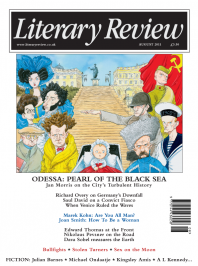Blair Worden
Epiphany on Trumpington Street
The Life and Thought of Herbert Butterfield: History, Science and God
By Michael Bentley
Cambridge University Press 381pp £50
Herbert Butterfield (1900–79) was once a name to conjure with, inside and outside the academic world. Regius Professor of History at Cambridge, and Master of Peterhouse, the college where he spent his working life, he wrote famous books which reached wide audiences: The Whig Interpretation of History (1931), The Englishman and His History (1944), Christianity and History (1949), and The Origins of Modern Science (also 1949). He took on an extraordinary range of subjects, from English history to world history, from the Renaissance to modern times, from international diplomacy to religion, and from political thought to the history of historical writing. He made his mark on all of them, though his books have more spread than depth. He disliked archival work, being more interested in interpreting the past than in discovering it. He contrived both to write too much too quickly and to leave major projects to which he had pledged himself unfulfilled.
In old age he lost his readership and his esteem. Attempts to revive his reputation since his death have hitherto drawn only specialist attention. Now Michael Bentley’s fine study, sympathetic but no whit idolatrous, seeks to place him on a wider map. Scrupulous and enterprising in the excavation

Sign Up to our newsletter
Receive free articles, highlights from the archive, news, details of prizes, and much more.@Lit_Review
Follow Literary Review on Twitter
Twitter Feed
Under its longest-serving editor, Graydon Carter, Vanity Fair was that rare thing – a New York society magazine that published serious journalism.
@PeterPeteryork looks at what Carter got right.
Peter York - Deluxe Editions
Peter York: Deluxe Editions - When the Going Was Good: An Editor’s Adventures During the Last Golden Age of Magazines by Graydon Carter
literaryreview.co.uk
Henry James returned to America in 1904 with three objectives: to see his brother William, to deliver a series of lectures on Balzac, and to gather material for a pair of books about modern America.
Peter Rose follows James out west.
Peter Rose - The Restless Analyst
Peter Rose: The Restless Analyst - Henry James Comes Home: Rediscovering America in the Gilded Age by Peter Brooks...
literaryreview.co.uk
Vladimir Putin served his apprenticeship in the KGB toward the end of the Cold War, a period during which Western societies were infiltrated by so-called 'illegals'.
Piers Brendon examines how the culture of Soviet spycraft shaped his thinking.
Piers Brendon - Tinker, Tailor, Sleeper, Troll
Piers Brendon: Tinker, Tailor, Sleeper, Troll - The Illegals: Russia’s Most Audacious Spies and the Plot to Infiltrate the West by Shaun Walker
literaryreview.co.uk